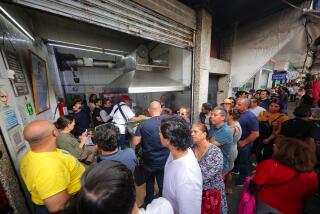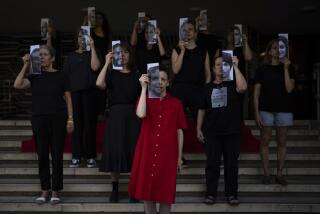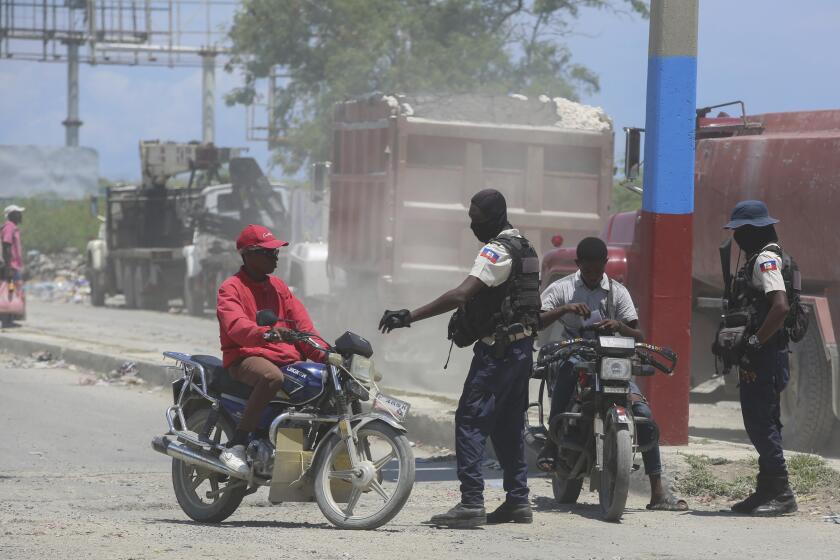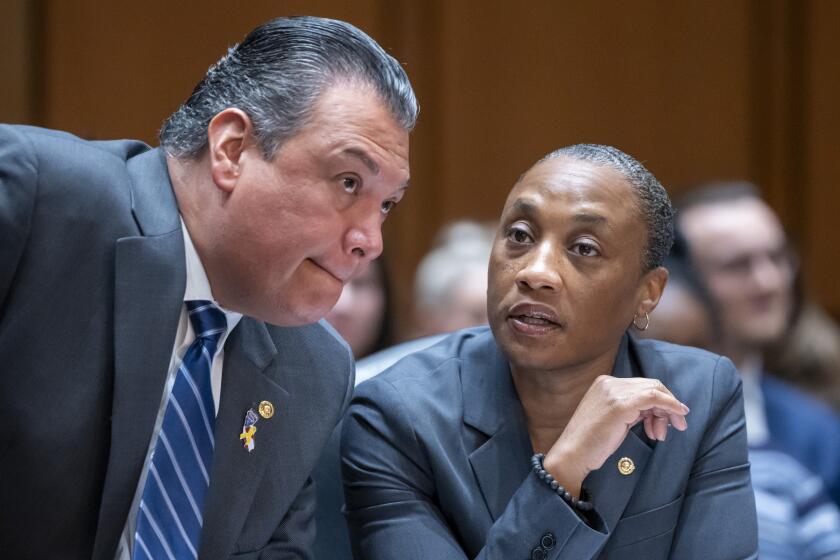He Takes Them Home
When Bill Broughton heard about Katie Ruth Wills, he did what he always does to prepare for a death call: He took a bath.
Then he combed his hair into a wavy pompadour and dressed in a freshly laundered white shirt and brown suit. He attached his tie to his shirt with a gold clip.
Other men may transport bodies “with short pants on, and shoes with no strings,” as he puts it, but Bill Broughton will never be one of them. It is a task he approaches with dignity.
Wills died in Charlotte, N.C., 370 miles away. A 63-year-old woman who for years cleaned houses for a living, Wills was in the habit of denying herself indulgences, so it surprised no one when she declined a crucial transplant to replace her kidney.
The week of Halloween, when a lung infection turned into sepsis, she rejected a feeding tube. Before she died -- “her little body just done gave out,” said her daughter, Kim Patterson -- she did make one very clear request: She wanted to be buried in Alabama, where she was born.
Bill Broughton, 74, makes these journeys all the time. When a funeral home calls him, he will climb into his Dodge Caravan and drive 750 miles north to Detroit or Chicago to bring a body back to an Alabama graveyard. He has traveled northeast to Philadelphia, and once, as far west as Idaho, through 3 feet of snow and mountains so beautiful they left him breathless.
His service is a rare one in an age when the dead generally take their last long journey by air. But in the northeast corner of Alabama, some families can’t afford the airplane ticket -- or they cannot abide the thought of their loved one being handled by strangers, in the cold cargo hold of a plane. In some cases, the loved one in question was afraid to fly.
For these people, Broughton will make a long, solitary journey.
“He’s a character,” said Wayne Bishop, owner of Chapel Hill Funeral Home in Anniston, who often refers work to Broughton. “He don’t even get out of the car. He’ll eat in that car. He don’t leave that body. When you take that body on, it’s a great responsibility.”
Night had fallen on a recent Thursday when Broughton arrived in Charlotte. Wills’ body -- drained of blood and filled with embalming fluid -- lay on a mortuary cot, draped with a white plastic sheet. Broughton had gotten the call from Anniston Funeral Services on Wednesday. Wills had been dead for a little more than a day.
Broughton helped slide her body onto his own cot, then rolled it into the back of his van, which is fitted with a hearse floor to keep caskets and stretchers in place. He covered her with a heavy velvet blanket. Then he shut the back door of the van and pulled away.
Already Broughton had been driving for seven hours. Beside the highway, steam billowed out of smokestacks and melted into the night sky. Eighteen-wheelers lined up for the night at weigh stations. The van was quiet. Mile markers slipped by one after the other.
When Broughton starts to drowse off on the highway, he plays tapes of gospel music and sings along, sometimes at very high volume. He laughs at “the unique, delightful humor of the Southern Negro,” a comedic act recorded by a white minister from the Mississippi Delta.
He will not stop unless forced to. If he is overcome by exhaustion, he will pull over at a rest stop, tip back his seat, and go to sleep in the car, beside the body he is carrying.
About 9:30, he pulled into the parking lot of an Outback Steakhouse and peered in the front. He was looking for a seat close to a window, which would allow him to watch the van while he ate.
It is not like transporting an object.
“You just don’t leave a body unattended,” he said. “You’ve got some of those maniacs out there that would do anything to get ahold of a human body. Those Satan worshipers. They had a case down here in the next county in Birmingham years ago, someone dug a lady up, got her head and everything to use in their services.”
Death is still taken personally in Wellington, the town where Broughton grew up. The dead are buried with their feet pointing east, so that they will be prepared to rise and face Jesus when he steps through the eastern sky. In the nearby town of Centre, the Tucker brothers still dig graves by hand, disappearing into the ground up to their sweat-soaked shoulders.
Older people can remember the way all activity seemed to cease on the day of a funeral; if a procession passed, cars pulled off the road and came to a stop. In their fields, farmers stood still and took their hats off.
In those days a body was never left alone, or with strangers; it was bathed and dressed and laid out in the front room, where friends and neighbors stayed awake all night, chatting. The body meant something. When a coffin was closed for the last time, it wasn’t unusual for mourners to bawl or scream.
Today, the rural South is still more bound to burial tradition than any other part of the country; last year, when 28% of bodies in America were cremated, the rate in Alabama was little more than 7%, smaller than any other state except for Tennessee.
But even here, things are changing: Young people don’t come by to clean up the country cemeteries where their families have been buried for generations, and Broughton fears the cemeteries will become overgrown and abandoned. Traffic has become so dense, Broughton said sadly, that it is probably dangerous to stop for a funeral procession.
“There’s not respect now for anything like that anymore,” he said.
Broughton worked for 26 years as a guard at a munitions depot at the Army base in Anniston. He had the skill of wakefulness, and in 1987, Bishop began asking him for help transporting bodies. Broughton charges only for “loaded miles,” and recently raised his price to $1.35 a mile. He has transported as many as 500 bodies a year.
“I do not like the death part,” he said, “but I thoroughly enjoy working with people.”
He can be merry on these journeys. Inside the steakhouse, he turned to a good-humored waitress and introduced himself, with a twinkle, as “the last person to ever let you down.” She gave him the fish eye. When she came back, he continued: “Once I do let you down, it’ll take a court order to get you back up.” He took pity on her, finally, and told her he was an undertaker.
Broughton proceeded to tell a series of undertaker jokes, ones that feature dead mothers-in-law and corpses in drugstores saying, “I need something for this coffin.” He has remarkable stories -- about the reactions of state troopers and hitchhikers when they peer in the back of his vehicle (their eyes become large and they run off like rabbits), and about a lapdog that stayed under a quilt beside its dead master for four days. And about the scent of decaying human flesh, and how different it is from the scent of a decaying animal.
“I’ve seen some things I can’t talk about, things that make your hair stand on end,” he said.
Crossing the border into South Carolina, the Caravan’s gas light went on, and Broughton was reminded that he is a little out of step with the world. He grew up in a house that was a mile away from the nearest neighbor, on land settled with mule and wagon by his great-grandparents. His family did not get electricity until he was 15.
He is, to this day, offended by the idea of credit cards, and has never owned one. He is insulted by gas stations that require prepayment, and, with Wills lying in the back of his van, stalked out of two such stations before he relented and forked over a $5 bill.
“Going back to my raising, I was taught that your word was your bond,” he said, grumpily. “I don’t want anything that’s not owed to me.”
It was early morning by the time Broughton passed the luminous skyline of Atlanta. Ahead was scrubby forest, and the grayish sandy loam of northeastern Alabama.
They were from the same place, the driver and the passenger. Both had picked cotton when they were growing up, and both knew what it was like to be poor. Both had lived through the racial upheaval of the 1960s.
Wills told her daughter stories about the time she marched with the Rev. Martin Luther King Jr. Broughton remembered, with some bitterness, that he was passed over for a job with the U.S. Marshals Service because “Bobby Kennedy wanted a black man in that job.”
“I’m a Southerner,” he said. “I guess to a point I’m prejudiced. I don’t personally believe in any two races intermingling.”
Still, on the day after Wills died, Broughton took her home, handling her with what can only be called gentleness.
It was 3 o’clock in the morning when Broughton made his delivery to Anniston Funeral Services. He rolled the cot out of the back of his van and unbuckled the straps from around the woman’s body. He cradled her in his arms and slid her off the cot and onto a dressing table.
Then the silver Caravan pulled out and Broughton began the last leg of his journey, toward the small ranch-style house that he shares with his wife.
There, he would be able to sleep for a few hours. Katie Ruth Wills was home.
More to Read
Start your day right
Sign up for Essential California for news, features and recommendations from the L.A. Times and beyond in your inbox six days a week.
You may occasionally receive promotional content from the Los Angeles Times.






